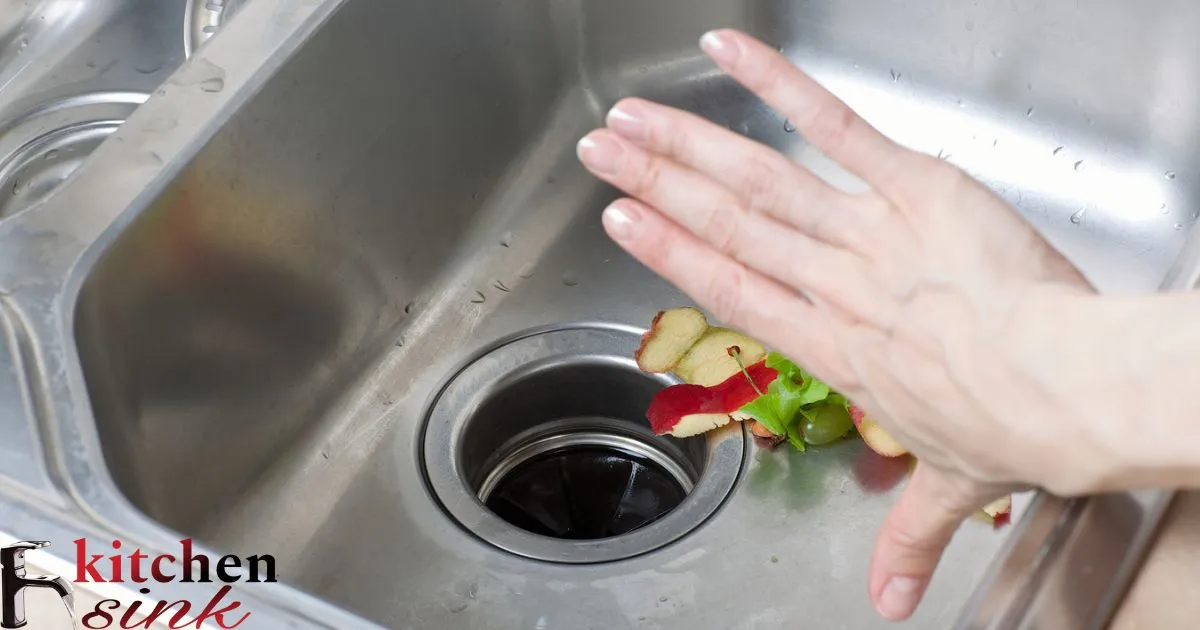A musty smell in the kitchen sink is an unpleasant odor that can develop from excess moisture, food buildup in the drain, or dirty garbage disposal blades. It’s an common issue caused by everyday use that can make the kitchen unpleasant to be in. Getting rid of a musty sink smell requires cleaning the pipes, garbage disposal, and using deodorizers to leave your sink fresh.
How to Get Rid of Musty Smell in Kitchen Sink? is an important question for any homeowner. That damp, moldy odor coming from the drain or garbage disposal is annoying and off-putting when you’re trying to cook or wash dishes. You don’t have to live with it or cover it up with fragrances. Targeting the source and doing a thorough scrub will help banish it for good.
Musty smells primarily develop in the kitchen sink due to the moist environment. Food scraps in the drain and dirty pipes or garbage disposal provide ideal conditions for mold and bacteria growth. Grease buildup also contributes by giving the smell something to cling to. Regularly cleaning and removing grime prevents this. Proper drying and ventilation additionally discourage musty sink smells.
Kitchen Sink Smell Musty
A musty smell from your kitchen sink is often caused by mold, mildew, or bacteria growing in the drain or pipes. Food particles and other debris can get trapped, allowing mold and mildew to thrive in the moist environment. As they grow, these microorganisms release smelly compounds. A partial blockage in the pipes can also trap water, creating an ideal environment for mold.
Causes Musty Smells In The Kitchen Sink
5 common causes of musty smells in the kitchen sink:
-
Mold and Mildew Growth – Moist environments like sinks can allow mold and mildew to grow, especially if food debris builds up. This causes a musty odor.
-
Clogged P-Trap – A clogged P-trap under the sink can prevent water from properly draining, allowing smells to come back up the drain.
-
Garbage Disposal Gunk – Food particles stuck in the garbage disposal can rot and cause foul musty smells.
-
Drain Clogs – Partial clogs in the drain pipe from grease, soap scum, hair, and other debris can lead to musty smells.
-
Rotting Organic Matter – Small bits of food and other organic material that washes down the drain can get trapped and decompose, releasing a musty rotten smell.
The most common solutions are thoroughly cleaning the garbage disposal, using a drain snake to clear clogs, cleaning the P-trap, and pouring baking soda and vinegar down the drain to break up debris and neutralize odors. Preventing food buildup and regularly maintaining drains helps avoid musty smells.
How Can I Identify The Source Of The Musty Kitchen Sink Smell?
To identify the source, start by running hot water through the sink for a few minutes to clear out the drain trap. Check underneath the sink for any evidence of leaks that could be feeding mold growth. Also inspect nearby areas for dampness.
If the smell persists, try pouring a mixture of baking soda and vinegar down the drain before rinsing with hot water. If this doesn’t eliminate the odor, Clean A Composite Kitchen Sink it likely means there is a larger mass of mold or mildew accumulating in the drain or pipes.
What Household Items Commonly Cause Musty Smells In The Kitchen Sink?
Food particles are the most common culprit behind musty kitchen sink smells. Fruits and vegetables can get trapped in the drain as you rinse them. Small bits of meat and dairy products also build up over time.
Oils and grease from cooking can coat pipes. Additionally, hair and beauty products washed down bathroom sinks make their way into kitchen pipes and can contribute to smells. Coffee grounds and tea leaves are other items that frequently get rinsed down drains.
When Should I Be Concerned About A Persistent Musty Smell From The Kitchen Sink?
If a musty odor lingers even after thoroughly cleaning and disinfecting the drain and pipes, it likely means there is a substantial accumulation of mold, mildew or bacteria. Persistent bad smells could also indicate a crack in the pipes or another issue allowing organic matter to build up out of sight.
A professional plumber should inspect the pipes to identify and address the root cause. An ongoing musty smell signals a problem needs addressing before it leads to deteriorating pipes or health issues.
How Can I Get Rid Of The Musty Smell In My Kitchen Sink?
Musty smells in the kitchen sink often come from built-up grime, food particles, and mold or mildew growth. To get rid of the smell, you’ll need to thoroughly clean the sink. Start by mixing together baking soda and vinegar into a thick paste and spreading it over the surfaces of the sink.
Let it sit for 15-30 minutes before scrubbing and rinsing. The acidity in the vinegar will help dissolve grime and buildup while the baking soda will absorb and neutralize odors. Pay close attention to the drain area, scrubbing it vigorously to remove debris caught in crevices.
What Are Some Homemade Remedies To Remove Musty Kitchen Sink Smells?
Homemade cleaners like baking soda, vinegar, lemon juice, and hydrogen peroxide can be highly effective at eliminating musty odors in the kitchen sink without harsh chemicals. Make a baking soda paste with just enough water to form a spreadable consistency. Apply it to the sink, let sit for up to 30 minutes, then scrub and rinse.
The baking soda will absorb odors. Straight vinegar can also be wiped over surfaces. For extra cleaning power, boil a solution of 1 cup vinegar, 1 cup water, and lemon slices and pour it down the drain when cooled.
The acidity will break up gunk. Hydrogen peroxide is another deodorizing option. Pour some directly into the drain before bed and let it bubble overnight to penetrate grime.
Cleaning Products Work Best To Eliminate Musty Odors From The Kitchen Sink
Baking soda and vinegar work well. Pour baking soda down the drain first. Then pour vinegar. This makes foam that cleans. Let sit for 15 minutes. Then rinse with hot water.
Bleach also helps with smells. Mix 1 cup bleach and 1 gallon water. Pour down drain. Let sit 1 hour. Then rinse with hot water. Kills bacteria.
Here is a table comparing the options
The baking soda and vinegar method is natural. The bleach solution kills bacteria well but is harsher. Both can help eliminate musty smells from the kitchen sink drain.
How Can I Prevent Musty Smells From Returning To My Kitchen Sink?
To prevent future musty smells in the kitchen sink, it’s important to thoroughly dry all surfaces after washing dishes, wipe down surfaces with a soft cloth soaked in hydrogen peroxide or rubbing alcohol weekly, clean the sink 1-2 times per month with an antibacterial cleaner, avoid pouring fats/oils directly down the drain.
Run very hot water through the drain before bed to clear debris, use strainers to catch food scraps when washing dishes, and pour 1 cup baking soda followed by 1 cup vinegar down drains monthly to keep pipes clear. Maintaining diligent cleaning habits will help prevent odors.
What Steps Should I Take To Keep My Kitchen Sink Smelling Fresh?
To keep the kitchen sink smelling continuously fresh, get into the habit of spraying it down with white vinegar after each use and wiping dry with a paper towel or soft cloth. The vinegar smell will dissipate as it dries. About once a week, sprinkle baking soda into the sink and use a damp sponge to gently scrub surfaces.
Rinse thoroughly. The baking soda will absorb odors over time. It also helps to run lemon rinds through the garbage disposal to add a fresh citrus scent. Use an enzymatic drain cleaner monthly to break up gunk. Open the sink cabinet when not in use so air can circulate. Replace sink strainers regularly. A routine cleaning regimen prevents odors.
How Do I Clean My Kitchen Sink Drain To Remove Musty Smells?
To clean your kitchen sink drain and remove musty smells, start by pouring 1 cup of baking soda down the drain followed by 1 cup of vinegar. Allow the mixture to sit for 5-10 minutes to work on breaking up residue.
Next, pour very hot (not boiling) water down the drain to help flush away debris. You can also try using a sink plunger to force the hot water through the drain more effectively. Regularly cleaning your drain this way every 1-2 months will help prevent future buildup and musty smells.
How Can I Unclog My Kitchen Sink Drain To Get Rid Of Musty Smells?
If your kitchen sink drain is clogged, it can contribute to trapped moisture and musty smells. To unclog it, first try a chemical drain cleaner made specifically for kitchen sinks – look for one that contains lye or sulfuric acid. Allow it to sit for 15-30 minutes before running hot water to rinse.
You can also use a sink plunger or metal snake to manually break up the clog. Finally, prevent future clogs by installing drain screens to catch food particles, using a disposal if available, and avoiding pouring fats/oils directly down the drain. Unclogging regularly is key to eliminating musty drain smells.
What Drain Cleaners Work Best For Musty Kitchen Sink Drain Odors?
The best drain cleaners for eliminating musty odors in kitchen sink drains contain powerful natural enzymes and bacteria that break down residue. Enzyme-based foaming cleaners are very effective because they cling to the inside of pipes.
Look for ones with multiple strains of bacteria as well as enzymes for the best odor removal. Always follow product instructions carefully. Using these types of cleaners monthly will keep unwanted smells away.
How Often Should I Clean My Kitchen Sink Drain To Prevent Musty Smells?
To prevent musty smells from developing in your kitchen sink drain, aim to clean it thoroughly at least once a month. Use a baking soda and vinegar treatment followed by hot water to break up gunk and residue regularly before it has a chance to build up too much.
Supplement this monthly cleaning with a weekly rinse of very hot water to keep things fresh. The key is not allowing organic matter like food particles and oils to accumulate over time. Staying on top of cleaning will keep unwanted odors away.
What Signs Indicate My Kitchen Sink Drain Needs A Deeper Cleaning?
Some signs your kitchen sink drain needs a deeper cleaning to remove musty odors include water draining slower than usual, bad smells that come from the drain itself, seeing an increase in fruit flies hovering around the sink, hearing gurgling sounds when water goes down, or seeing bubbles.
These symptoms indicate there is a significant amount of buildup or blockage happening in the pipes underneath that requires thorough cleaning. If you notice one or more of these, it’s definitely time to take action to prevent worsening smells.
What Causes Recurring Musty Smells In My Kitchen Sink?
A common cause of a musty odor from the kitchen sink is mold and mildew growth. This thrives in the moist, dark environment under the sink. Food particles and other debris passing through the drain can accumulate and allow mold colonies to develop.
Another source is a small, unnoticed water leak that soaks surrounding wood over time, causing it to mold. Bacteria buildup from items like food waste or hair can also cause smells, especially if drainage gets slowed.
How Can I Determine If The Musty Kitchen Sink Smell Is From My Garbage Disposal?
If the smell seems to originate from the garbage disposal area, remove the disposal cover and inspect inside with a flashlight for any visible mold, food buildup, or slime. Use a brush or other tool to manually clean the disposal interior. Run ice cubes, salt, citrus peels and baking soda through the disposal to scrub the inside.
If odors persist despite cleaning, the disposal may be cracked or otherwise damaged, allowing organic waste to accumulate in hidden crevices. Consider replacing an older disposal if problems continue.
What Issues Can Cause My Dishwasher To Create Musty Smells In The Kitchen Sink?
The dishwasher drain hose connects to the sink drain pipe, so smells can sometimes transfer from one to the other. A main culprit is food particles stuck and rotting in the dishwasher filter or pump. Run the dishwasher empty on the hottest cycle with vinegar or dishwasher cleaner to sanitize the interior.
Also inspect the drain hose where it enters the sink pipe for any kinks that could trap water and breed bacteria. A damaged hose can also leak, causing sink cabinet mold.
How Can A Clogged Kitchen Sink Pipe Or P-Trap Contribute To Musty Odors?
When debris accumulates to partially block the kitchen sink drain pipe, P-trap or other plumbing, water flow slows. This allows organic matter to collect in the pipes and rot, producing a musty stench.
A drain snake can remove clogs, but a stubborn blockage may require disassembling pipes. Clean out the P-trap below the sink to eliminate odors. Using a sink strainer when washing dishes can prevent future clogs.
When Should I Call A Plumber For A Musty Smell Originating From The Kitchen Sink?
If DIY cleaning solutions don’t eliminate a persistent rotten smell from the sink drain within a couple weeks, contacting a plumber is advisable. A professional can inspect for hidden leaks or points of deterioration allowing organic waste to accumulate.
Replacing severely corroded pipes or a damaged P-trap may be necessary. A plumber also has specialized tools to clear difficult clogs or blocked vents that DIY methods cannot resolve. Calling early on for a stubborn odor can minimize later damage.
How Can I Prevent Musty Odors From Returning To My Kitchen Sink?
To prevent musty odors from returning, it’s important to thoroughly clean the drain and garbage disposal on a regular basis. Pouring boiling water or a drain cleaner monthly will help break up grease and food buildup.
You can also use baking soda and vinegar to clean the drain. Finally, always run water into the drain after using the sink to flush away debris. Keeping the drain clear is key to preventing odors from recurring.
What Ongoing Kitchen Sink Maintenance Can Prevent Musty Smells?
Regular maintenance like using a sink strainer, avoiding pouring fats/oils down the drain, and running the garbage disposal can help prevent buildup that causes odors. Additionally, cleaning the sink basin weekly using either vinegar, lemon juice, or an antibacterial spray will inhibit bacterial growth.
Wiping standing water in the sink after each use is also beneficial. Finally, flushing all drains with hot water monthly will clear any debris and keep water flowing freely.
What Cleaning Products Keep Kitchen Sinks Smelling Fresh Long-Term?
Baking soda, vinegar, lemon juice, and antibacterial spray are great for cleaning sinks and preventing musty smells long-term. Baking soda neutralizes odors and scrubs away grime. Vinegar kills bacteria and removes hard water deposits.
Lemon juice cuts through grease and leaves a fresh citrus scent. Antibacterial spray prevents future bacteria growth. Using these natural products regularly keeps sinks fresh.
How Can I Ensure My Kitchen Sink Drain Stays Clog-Free?
Using a sink strainer to catch food debris, avoiding putting fat/oils down the drain, and running plenty of water while operating the garbage disposal will help keep drains clog-free.
Additionally, pouring boiling water or chemical drain cleaner down the drain monthly breaks up buildup before it can cause a clog. Always running water into the drain after use helps too. Staying vigilant about what goes down drains prevents clogs.
What Steps Can I Take To Keep The Kitchen Garbage Disposal Clean And Odor-Free?
Grinding up citrus peels, ice cubes, or baking soda in the disposal helps scrub away residue. Avoid grinding starchy foods like rice or pasta which can get stuck. Pouring boiling water while running the disposal monthly will flush out debris.
And cleaning the disposal by filling it halfway with soapy water then running it prevents buildup. Taking these steps keeps the disposal clean and odor-free.
Frequently Asked Question
What Causes A Musty Smell In The Kitchen Sink?
Musty kitchen sink smells are commonly caused by mold, mildew, clogged pipes, or rotting debris.
Does Bleach Help Remove Musty Odors From Drains?
Yes, pouring a bleach solution down the kitchen sink drain helps kill bacteria and eliminate musty smells.
Will Baking Soda And Vinegar Get Rid Of Bad Smells In The Sink?
Baking soda and vinegar can help remove musty odors when poured down the drain to break up gunk and debris.
Why Does My Garbage Disposal Cause My Sink To Smell Musty?
Food particles stuck in the disposal can rot and create foul smells. Properly cleaning the disposal prevents this.
How Can I Prevent Musty Sink Smells From Returning?
Regularly maintaining drains, clearing any clogs, and preventing food buildup helps avoid recurring musty kitchen sink odors.
Conclusion
A musty smell in the kitchen sink is often caused by a buildup of food, grease, hair, and other debris in the drain and pipes. To get rid of this unpleasant odor, it’s important to thoroughly clean and disinfect the drain on a regular basis.
First, pour boiling water or a chemical drain cleaner down the drain to help break up and flush away grease and organic matter. You can also try using baking soda and vinegar. Let the mixture foam and work for several minutes before rinsing with hot water.
For ongoing prevention, use a sink strainer, avoid pouring fats and oils, and run plenty of water when operating the garbage disposal. Regular cleaning and maintenance is key to keeping kitchen sink drains free of buildup and foul odors long-term. Grinding citrus peels or ice in the disposal will also help scrub the inside and leave a fresh scent. With consistent care and cleaning, you can get rid of and prevent musty smells in the kitchen sink.



